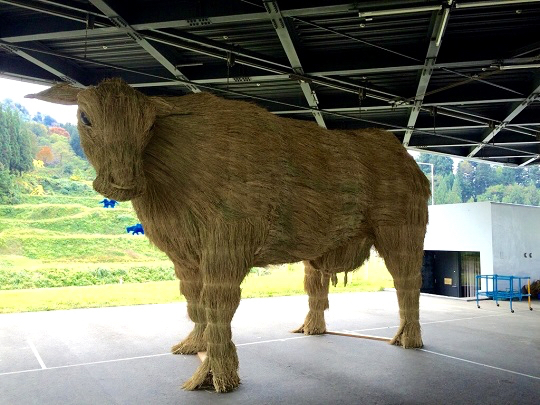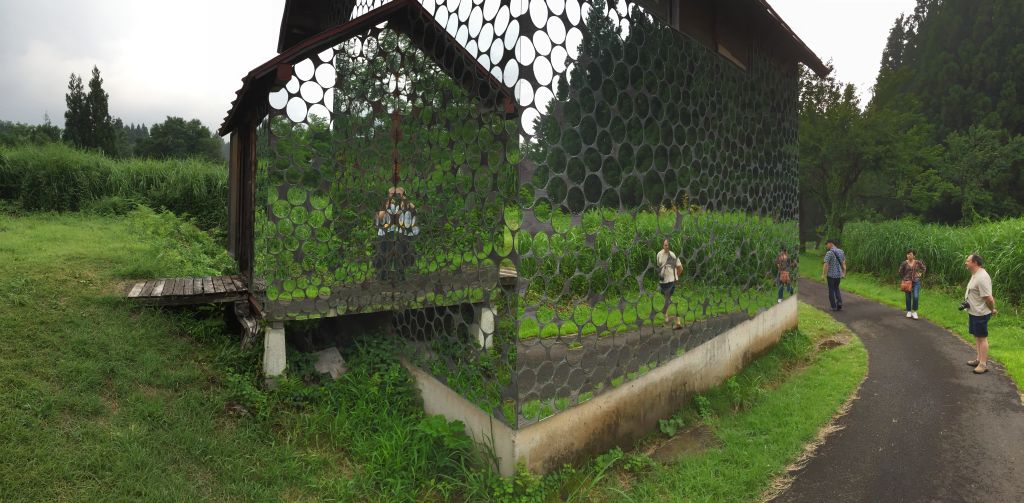
Camarillo, Calif., Nov. 6, 2015—Two CSU Channel Islands (CI) instructors will bring together scholars and artists from Japan and Los Angeles this week to discuss artistic work that crosses the boundaries between art and social activism. Their symposium will focus on social practice art in Japan and a project closer to home along the Los Angeles River.
CI English program chair Brad Monsma will be moderating a Nov. 13 symposium at the University of Southern California (USC) called “Art Place: Japan LA,” from 4:15 p.m. to 5:45 p.m. in Room 240 of the Doheny Memorial Library. CI Art Lecturer and ceramicist Amiko Matsuo will also be participating.
The discussion on Friday, Nov. 13 is about “social practice art,” which is aimed at community engagement. It invites people in the community to collaborate and participate in creating an art practice that addresses social and environmental issues.
Speaking at the event will be Fram Kitagawa, founder and director of the Echigo-Tsumari Art Triennale, a contemporary art festival held every three years in the rural Echigo-Tsumari region of the Niigata Prefecture in Japan.
Monsma and Matsuo first visited Echigo-Tsumari during a research trip to Japan in the summer of 2014. They saw abandoned houses turned into public art with a blanket of mirrors and hundreds of toy ships and planes made by school children from rice straw as part of a work about political tension in the South China Sea.
“Every three years since 2000, artists from all over the world set up installations in collaboration with rural villages a three-hour train ride from Tokyo,” Monsma explained. “We were there trying to understand how art is revitalizing these communities and how it’s connected to the landscape and ecology of the region.”

They left business cards at the museum there and received a call back with a request that they translate Kitagawa’s concept book, “Art Place Japan: A Vision to Reconnect Art and Nature” (Princeton Architectural Press 2015). It is being released this month.
Monsma and Matsuo were then invited to an international symposium in Japan in 2015, which gave them a chance to talk with other artists and scholars about social practice art in Japan, Taiwan, France, and Australia.
“Social practice art is booming all around the world, including in Southern California. The symposium at USC is a chance for an international dialogue about how art can help create resilient communities,” Matsuo said.
On the panel with Kitagawa will be representatives from a collective of artists, designers, planners, writers and educators called Project 51. The collective is seeking to transform and protect the Los Angeles River with an effort called “Play the LA River,” a public art and community outreach project that is attempting to draw together those who live along the 51-mile urban waterway.
Members of Project 51 include UCLA Associate Professor of Literature and Environment Allison Carruth; documentary photographer and designer Barron Bixler; and UC Riverside Professor of Public History Catherine Gudis.
The event is co-sponsored by the Japan Foundation with support from the University of Washington-JSPS Joint Symposium on Socially Engaged Art in Japan, the Shinso Ito Center for Japanese Religions and Culture at USC, and Vibrant Lands Satoyama Institute, a nonprofit developed by Matsuo and Monsma focused on developing interdisciplinary arts residencies in Japan.
Monsma and Matsuo will be taking a van of nine hand-selected CI students who are exploring these ideas, Monsma said. He hopes the idea of social practice art ignites the imaginations of the students.
“More and more, art is not just about making objects, but about thinking of ways to change the world and strengthen communities,” Monsma said.
# # #
About California State University Channel Islands
CSU Channel Islands(CI) is the only four-year, public university in Ventura County and is known for its interdisciplinary, multicultural and international perspectives, and its emphasis on experiential and service learning. CI’s strong academic programs focus on business, sciences, liberal studies, teaching credentials, and innovative master’s degrees. Students benefit from individual attention, up-to-date technology, and classroom instruction augmented by outstanding faculty research. CI has been designated by the U.S. Department of Education as a Hispanic-Serving Institution and is committed to serving students of all backgrounds from the region and beyond. Connect with and learn more by visiting CI's Social Media.
